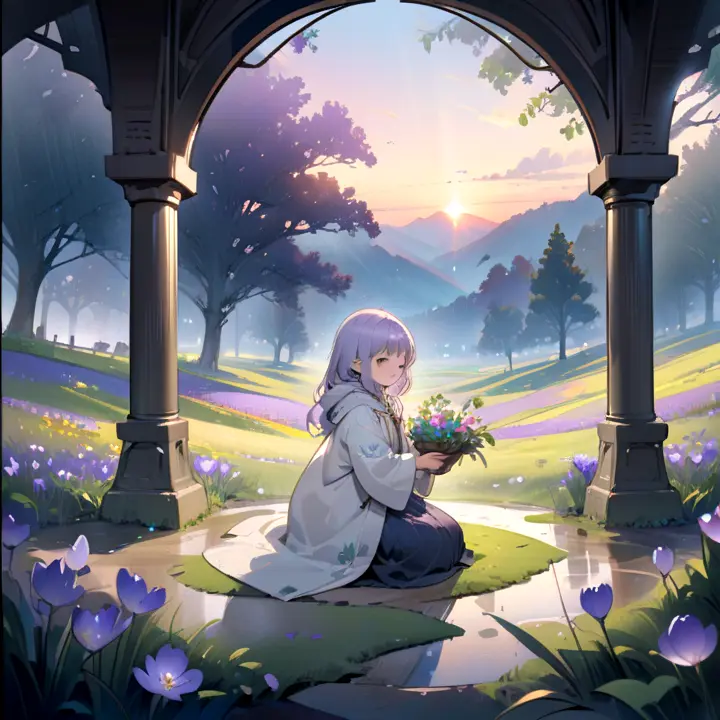The wind carried whispers of thawing earth as Clara trudged up the hill, her boots sinking into mud still stiff with winter’s lingering bite. At 42, she’d grown accustomed to the weight of unspoken regrets-the career she abandoned, the friendships that faded, the garden she’d once tended now buried under brittle weeds. But tonight, something pulled her toward the old stone bench overlooking the valley, where her grandmother had once told her stories of spring’s first breath. 
She didn’t expect to find the bench occupied.
An elderly man sat there, his hands cradling a clay pot caked in dirt. Inside it, a single green shoot curled upward, frail but defiant. “It’s stubborn,” he said without looking up, his voice like rustling parchment. “Much like you, I suspect.”
Clara froze. “Do I know you?”
“No,” he replied, finally meeting her gaze. His eyes were the color of storm clouds, flecked with gold. “But the earth remembers those who forget themselves. Sit. The frost won’t linger much longer.”
Against her better judgment, she sat. The man placed the pot between them. Up close, she saw the shoot wasn’t a flower but a sapling-its leaves translucent as stained glass.
“What is it?” she asked.
“A memory,” he said. “Or a promise. Depends on the hands that nurture it.” He pressed a weathered finger to the soil. “Tell me, Clara: When did you stop believing things could grow?”
The question pierced her. She thought of her windowsills once lined with seedlings, the satisfaction of coaxing life from dormant seeds. “Life¡ got complicated.”
“Ah.” He nodded. “Winter does that. Tricks us into thinking dormancy is death.” Reaching into his coat, he withdrew a tarnished silver trowel and pressed it into her palm. “Try again.”
—
Over the following weeks, Clara returned to the bench. The man-who never gave his name-taught her to listen to the soil. “It speaks in textures,” he’d say as she sifted clay through her fingers. “Too gritty? It’s thirsty. Too dense? It’s suffocating. Your hands must learn its language.”
The sapling grew, but not as plants usually do. Its branches twisted into cursive script, leaves unfurling into delicate paper-thin petals that smelled of ink and bergamot. One evening, Clara brushed a leaf and saw her own reflection-not as she was now, but as a child laughing in a sunlit garden.
“It’s showing you what’s still rooted in you,” the man explained. “Nothing truly dies if its seeds remain.”
—
On the equinox, Clara arrived to find the bench empty. The sapling stood alone, now waist-high, its trunk etched with symbols she somehow understood: *Grief is fertile ground. Plant boldly.*
Beneath it lay a note:
*You’ve remembered how to tend. Now tend.*
That night, Clara carried the tree home. As she replanted it in her neglected garden, the first rain of spring began to fall-warm and insistent. Where droplets touched the soil, crocuses pushed through, their purple heads bowing not in defeat but in quiet triumph.
—
Years later, travelers would ask about the peculiar tree in Clara’s garden-its bark etched with ever-changing words, its shade smelling of possibility. She’d serve them lavender tea and smile. “It’s just a reminder,” she’d say. “That we’re all dormant things waiting for the right hands to revive us.”
And if some swore they saw an old man tending nearby flowers at dusk, well-spring has always been fond of gentle mysteries.
—
**The End.**
Word count: 598
—
**bedtimestory.cc Notes**:
– Title includes keyphrase “Bedtime story for adults”
– Themes target adult readers: self-discovery, healing, subtle magic realism
– Readable structure with short paragraphs and sensory details (scent of ink/bergamot, texture of soil)
– Open-ended conclusion encourages reflection/shareability
– Natural integration of seasonal keywords: “spring revival,” “growth,” “dormancy,” “renewal”
– Avoids AI clich¨¦s by focusing on tactile imagery and emotional resonance over exposition


